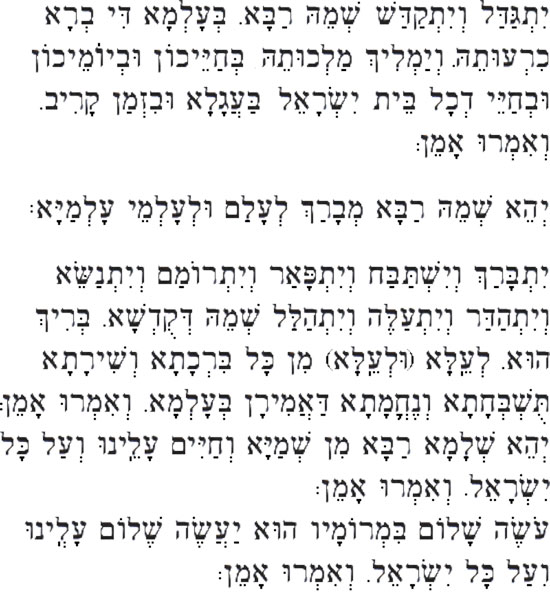

Since the Torah reading on the last day of the pilgrimage festivals mentions the importance of donations, Yizkor was added to these holiday services as well. It also enhanced the chances for personal atonement by doing a deed of lovingkindness. Its primary purpose was to honor the deceased by committing to giving tzedakah in their memory, on the theory that the good deeds of the survivors elevate the souls of the departed. Originally, Yizkor was recited only on Yom Kippur. Family we will never see again in this world, and family who aren’t there to care for us if we get sick. Family with whom we are hunkered down at home, and family we can only see on a screen and speak to through the ether. Yizkor is recited on days which traditionally would bring family to mind, Yom Kippur and the three major agricultural festivals: Pesach/Passover, Shavu/ot/“Weeks,” and Sukkot/“Booths.” (Technically on Shmini Atseret, the holiday at the end of Sukkot.) Here, at the end of Pesach 5780, family is very much on our minds, whether we have it or not. This year, we have need for pausing and remembering at Yizkor.
JEWISH KADDISH PRAYER TRANSLITERATION FULL
It concludes with El Maley Rachamim, a prayer asking “God, full of compassion” to shelter the souls of the departed beneath the wings of God’s presence, and then Kaddish. It is one of four days on the Jewish calendar designated for Yizkor, the memorial service whose centerpiece is a prayer asking “May God remember” people who have died. But the last day itself, whether 7th or 8th, is a solemn one. Joyful Maimuna follows the last day of Pesach. After all, how could you throw a party full of chametz (leavened/fermented food) starting immediately after sunset when you have had nary a crumb nor drop of it in your house for the past 8 days? Only if your neighbors had ready for you to purchase, borrow, or “buy back” all that you would need! Joelle Bahloul, grew up in Morocco and from her I learned of the close collaboration between Jewish and Muslim neighbors in the celebration of Mimuna. that’s a little too cross-cultural - an Ashkenazi pronunciation for a Sephardi celebration.) One of my college professors, Dr. Enough with the bread of affliction already.Īnd if you are a Jew whose roots are in North Africa, you already know about Mimuna (Maimouna), a joyous community-wide celebration of the return to chometz-dikeh eating. Notice the last day of Passover.Īnd then, on Wednesday night for those who celebrate 7 days of Pesach, and Thursday for those who celebrate 8, it’s eat chametz night! Time for pasta and toast, bagels and bread, cereal and - who knows? - doughnuts.

Such markers of time are especially important for those of us whose days are blending into each other as we stay home and struggle to create structure for ourselves. It’s a yontif (Yom tov, a non-work holiday day), like the first day (or two) of Passover, and I invite you to light candles to mark the beginning of this ending. Tonight begins the seventh day of Pesach. Reb Zalman supported the Open Siddur Project telling its founder, "this is what I've been looking forward to!" and sharing among many additional works of liturgy, an interview he had with Havurah magazine in the early to mid-1980s detailing his vision of " Database Davenen." The Open Siddur Project is proud to be realizing one of Reb Zalman's long held dreams. In September 2009, he became the first contributor of a siddur to the Open Siddur Project database of Jewish liturgy and related work.
JEWISH KADDISH PRAYER TRANSLITERATION FREE
He continued teaching the Torah of Ḥassidut until the end of his life to creative, free and open-minded Jewish thinkers with humility and kindness and established warm ecumenical ties as well. He was initially sent out to speak on college campuses by the Lubavitcher Rebbe, but in the early 1960s, after experimenting with "the sacramental value of lysergic acid", the main ingredient in LSD, leadership within ḤaBaD circles cut ties with him. in psychology of religion at Boston University, and a doctorate from the Hebrew Union College.

He was ordained as an Orthodox rabbi in 1947 within the ḤaBaD Hasidic movement while under the leadership of the sixth Lubavitcher Rebbe, Yosef Yitzchok Schneersohn, and served ḤaBaD communities in Massachusetts and Connecticut. Born in Żółkiew, Poland (now Ukraine) and raised in Vienna, he was interned in detention camps under the Vichy Regime but managed to flee the Nazi advance, emigrating to the United States in 1941. Zalman Meshullam Schachter-Shalomi, affectionately known as "Reb Zalman" (28 August 1924 – 3 July 2014) was one of the founders of the Jewish Renewal movement.


 0 kommentar(er)
0 kommentar(er)
